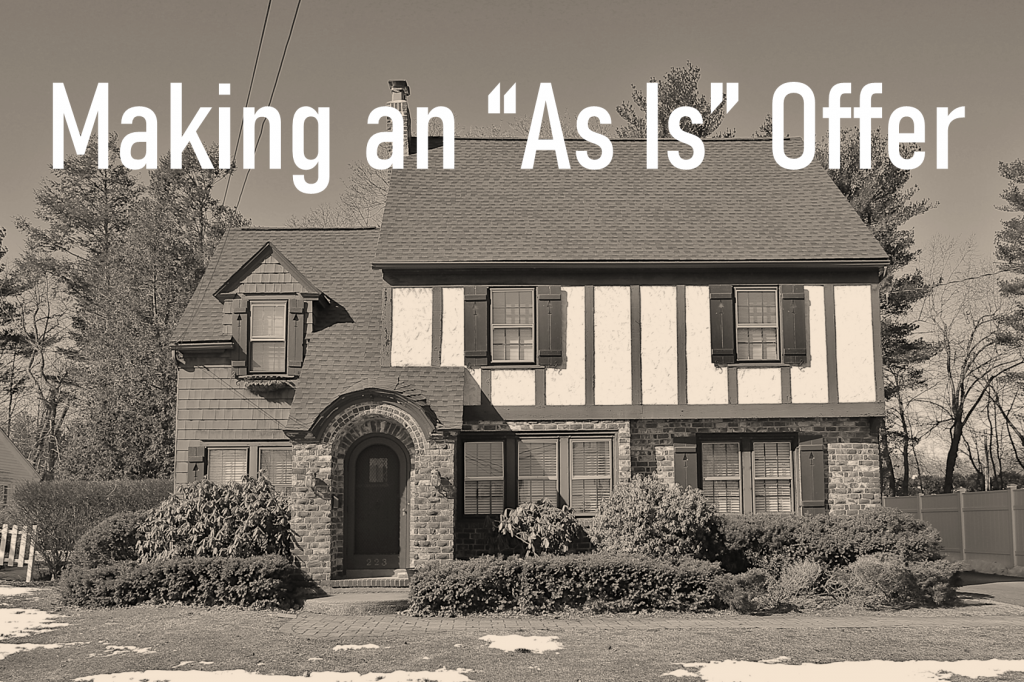
Fierce competition for quality single-family properties in Greater Hartford has forced buyers to think hard about every aspect of their offer. How much should they offer to pay? Is their financing as strong as possible? What about their other terms?
For buyers willing to offer a strong price, and who are already doing everything they can to optimize their financing, an additional way to make their bid stand out from the crowd is to submit an “as is” offer.
To be clear, by “as is” I mean that the buyer promises to close on the house without asking for additional concessions from the seller. Our local real estate association has a form that can be included in the Purchase Contract that explicitly documents this term.
Importantly, buyers who submit an “as is” offer can still reserve the right to perform inspections. I strongly recommend all but the most experienced homeowners follow through and inspect their potential new home because it is important to know if there are hidden defects, and inspections are a fantastic way to learn more about the home. An “as is” offer WITHOUT a home inspection would be even more attractive to a seller, but that’s not what I’m talking about here because it has considerably more risk.
Taking a step back, consider the likely outcomes of the home inspection.
The most common is that the inspector finds typical issues with the home that are not significant risks to the buyer. It is normal for our housing stock to need electrical updates and/or to have minor plumbing issues. There are other common findings that we have no visibility to while touring the property, but see often enough that we have a good sense of their likely cost.
If the buyer talks through the potential findings with their agent prior to bidding, and can get comfortable with the likely costs associated with those findings, then this could be a good approach. Ideally the buyer has hired a knowledgeable agent who has paid attention during their numerous previous home inspections, and can flag obvious issues during an initial tour. This narrows the scope of surprises that might come out of the home inspection.
Another outcome of the home inspection is that the inspector finds significant issues that are more than the buyer wants to take on. The buyer still has the right to back out based on the inspection in an “as is” deal, so if they are uncomfortable with the results they are not forced to purchase the home.
Problems can show up where they were not expected, or they can be so financially significant that the buyer simply cannot afford to take them on. For example, consider a septic system, which is not visible during a house tour. A buyer of mine was under contract to purchase a home that was about 10 years old. Even though septic systems are designed to last for many decades, this seller had abused their septic to the point that it was quickly approaching the end of its life. It had not yet failed, so the seller was unwilling to replace it. My buyers were not interested in taking on a property with such a significant and unexpected near-term expense, so they backed out of the deal and found a different property. They would still have been able to do this in an “as is” deal.
The final inspection outcome scenario is unlikely – that the inspector finds nothing wrong with the house. I can’t remember the last time I went to a home inspection where nothing significant was found. Normally I make notes as the inspector progresses through a home and I end up with somewhere between one page and two pages of single-spaced bullet points.
In a normal deal, a deal without an “as is” clause, there is a negotiation after the home inspection. Sellers might agree to make repairs prior to closing, or to offer the buyer a credit so the buyer can make the fix once they own the place. The outcome of the negotiation depends on the priorities and personalities of the two sides.
My experience is that the value of concessions from home inspections are usually between $2,000 and $5,000. A few deals per year out of the 50ish we’re involved with will have larger concessions, but it is rare for there to be a concession of more than $10,000. If the findings are significant enough to warrant a five figure concession then there is a very good chance the buyer will choose to walk away.
Home inspections are a significant source of uncertainty to sellers as they market their properties. They are also an important activity for buyers to confirm the condition of the property and learn about how it operates. A potential bidding strategy for buyers willing to take a modest additional risk in order to make their bid more attractive in a competitive landscape is to submit an “As Is” offer, though this will only be effective if paired with a strong price and optimized financing.